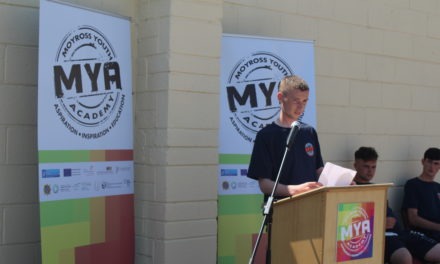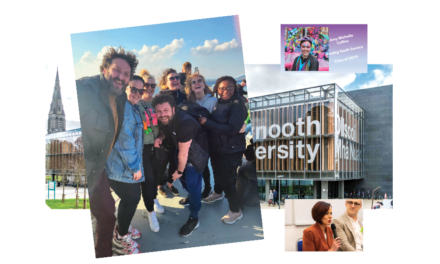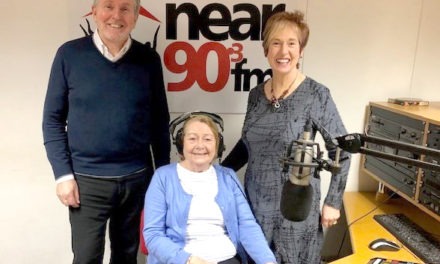We can all agree that tech knowledge is essential for the future of work, but how can communities support tech learning?
It is clear that the tech sector is a force to be reckoned with – that a grounding in tech skills can make a monumental difference in a young person’s life, and can create shifts and growth in their communities.
So what should those communities be doing to create a tech-savvy generation, and to support adults to join the digital revolution? And how, in particular, can girls and young women be encouraged to pursue these skills?
Speaking at Inspirefest 2018, Dr Anne-Marie Imafidon (the co-founder of a programme called Stemettes) answered that question: “Introduce [girls and women] to all kinds of people and spaces – show them that you don’t have to be white and male to be part of innovation.”
Of course, the focus doesn’t have to be solely on the female (slightly more than) half of the population, and many programmes can be welcoming of boys and young men as well – it’s just a matter of seeking them out.
If you’re interested in setting up a tech-focused programme in your area, but don’t have the time or energy to reinvent the wheel, the following should give an idea of what’s available to emulate and where you can start.
#techmums
#techmums consists of a five-week guided course that aims to build confidence by tackling different aspects of technology in classroom-based workshops. It looks at basic IT skills, online safety, and even programming and app design, and fosters a community of passionate, self-motivating and self-confident tech-savvy mums.
“Today, it’s easy to see technology as the enemy, whereas, in fact, it can be life-changing in an incredibly positive way,” founder Dr Sue Black OBE has said. “Our courses help women harness that potential in their own lives, giving them the confidence, skills and inspirations to play an active role in our shared digital future.
The programme saw early success, with research showing that it gave participants a huge boost in their confidence with tech and, more generally, in their personal confidence. According to the #techmums site, the headmaster of the first pilot school also saw a marked difference in the children of these mothers.
Although initially operating solely in the UK, #techmums came to Ireland in 2015 with a successful first run in Dublin’s Digital Hub.
CoderDojo
CoderDojo has become a household name and a global coding-club phenomenon. You may be surprised to learn, therefore, that it was started by a then-18-year-old James Whelton – a young tech-whizz from Cork.
The homespun club grew incredibly quickly when Kinsale-born investor Bill Liao came onboard, with Dojos popping up in Asia, the US, South America and Africa within the first year. Now, there are more than 1,900 verified Dojos in 93 countries around the world, and new Dojos are starting almost every day.
The CoderDojo movement aims to impart an understanding of programming languages at an early age, through a network of free, volunteer-led, community-based programming clubs aimed at young people.
You might think you need a grounding in tech to set one up, but you’d be wrong.
“We’ve had people from all backgrounds start clubs, from youth workers who taught themselves some basic programming so they can get a club up and running, to seasoned programmers who would have loved the opportunity when they were young,” Giustina Mizzoni, CoderDojo’s executive director, told us.
“You can start a Dojo that runs once a week, once a fortnight or monthly to reach the youth in your community. If that still seems a little daunting, we have created a quick three-week course – in one hour a week, our team will walk you through the process.”
Online and in-person training is available for interested volunteers.
Women Who Code
Aimed at an older audience than many of the other resources listed here, Women Who Code is a global network that targets career-aged tech professionals (and those interested in gaining a foothold in the industry).
With more than 167,000 members and a presence in more than 80 cities, Women Who Code is striving to create a world where women are proportionally represented as tech leaders, execs, founders, venture capitalists, board members and software engineers.
“We are creating a space for those who exclusively identify as female to come together and develop their technical skills and grow their digital confidence,” says Sheree Atcheson, founder of Women Who Code UK and board-appointed global ambassador for the international non-profit.
“We are showcasing relatable local role models in all of our locations while highlighting the sheer power and impact women can have on this industry. It’s fantastic.”
Member have access to coding resources, leadership opportunities and exclusive job boards. And the best bit is that it’s all free.
Says Atcheson: “We provide all of our meetups for no charge because, regardless of your socioeconomic background, you should be able to obtain knowledge and grow your skillsets—everyone is important in this industry.”
Stemettes
A UK- and Ireland-based social enterprise focused on supporting young women into science, technology, engineering and maths (STEM) careers, Stemettes is working towards a world in which women are proportionally represented in the sector, and is aiming to inspire the next generation by showing them the amazing and successful women already working in STEM.
The organisation does this through a series of panel events, hackathons, exhibitions and mentoring schemes, and a policy close to many young women’s hearts: it’s free, it’s fun and it involves food. No wonder more than 40,000 girls between the ages of five and 21 have signed up…
In 2018, Stemettes launched Stemillions, a school-based network of clubs run by young women and designed to allow exploration of STEM, with clubs sorted into houses and competing for the (virtual) House Cup and a slew of other prizes.
An Cosán
An Cosán hardly needs an introduction, but we’ll give it one anyway: the Tallaght-based organisation—founded in 1986 as ‘the Shanty’ by current Minister for Children and Youth Affairs, Katherine Zappone, TD, and Dr Ann Louise Gilligan—provides adult education and other services to women from disadvantaged areas.
The organisation offers the educational support of basic IT skill development and a number of digital interventions designed to bridge the digital divide, ranging from ‘Computers for the Terrified’ (open to men and women) and ECDL (European Computer Driving Licence) classes, to a QQI Level 5 qualification in Business and Information Technology. Other courses cover social media for beginners, online security, web and app design, and cyberbullying.
There is also an ‘An Cosán Tech Army’—a group of people passionate about providing awareness, competence, reliability and physical access to digital technologies—which aims to support people as they work together to take action to bridge the digital divide, and provides communities with access and training.
A Digital Pathways programme develops and delivers IT workshops at a variety of locations around the country, offering accessible education in digital and employability skills.




